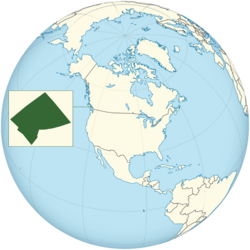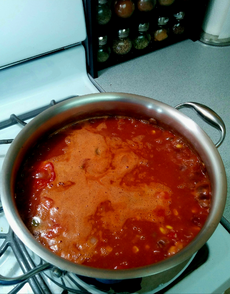Kingdom of Permaria
This article refers to a micronation or element of micronationalism which is defunct and no longer exists. You can help make the article reflect that or ask on the talk page for further information. |
Kingdom of Permaria Königreich Permaria (German) | |
|---|---|
| Motto: Suscipere et Finire "Support and Finish" | |
| Anthem: Our Homeland by the Sea | |
 Location of claimed territory (green) on world map | |
 | |
| Status | Active |
| Capital | Glacia |
| Official languages | English |
| Recognised national languages | German |
| Ethnic groups (2024) |
|
| Religion (2024) |
|
| Demonym(s) | Permarian |
| Government | Unitary parliamentary semi-constitutional monarchy |
• Monarch | Dustin I |
• Prime Minister | Dionne Anderson |
| Legislature | Parliament |
| Independence from Canada | |
• As a principality | 9 October 2020 |
• Union with Burdany | 2 October 2023 |
• Kingdom proclaimed | 8 March 2024 |
• Merger with the Sitkan Empire | 29 March 2024 |
| Area | |
• Total | 0.107 km2 (0.041 sq mi) |
| Population | |
• 2024 estimate | 10 |
| HDI | 0.936 very high |
| Currency | Permarian Pound (£sd) |
| Time zone | UTC−8 (PST) |
• Summer (DST) | UTC−7 (PDT) |
| Date format | mm/dd/yyyy |
| Driving side | right |
| Calling code | +1 |
| Internet TLD | .pi (proposed) |
Permaria, officially the Kingdom of Permaria, was a landlocked micronation that claimed approximately 0.40 acres of territory on Vancouver Island in the Canadian province of British Columbia. Permaria declared its independence from Canada in 2020 but its existence was never formally recognized by the United Nations or the government of any sovereign state.[1]
Permaria was founded by Canadian micronationalist Dustin Salisbury. It was governed as a kingdom under a semi-constitutional monarchy headed by the King of Permaria. The king was a hereditary sovereign who reigned as the nation's head of state, while an elected prime minister served as head of government. The political structure of Permaria was largely modeled on that of Liechtenstein, and had a culture deeply inspired by German, Irish, and Canadian history.
Permarian foreign policy prioritized diplomacy with other micronations and independence movements, as well as pressing its rights to self-determination in the wider international community. Permaria also dedicated its efforts towards developing its small but highly diversified economy. It had a population of 10 permanent residents, and regularly issued its own currency, passports and micronation-themed memorabilia.
Etymology
The name "Permaria" is derived from the Latin words per maria which means "by the seas". Geographically, the country was located near the Pacific Ocean to its west and the Salish Sea to its east.
History
The Permarian nation was founded on 9 October 2020. Canadian citizen Dustin Salisbury was initially inspired to enter the world of micronationalism during the summer of 2019, after researching the history of the Republic of Molossia. Over the course of the following year, Salisbury became involved with the Dominion of Vancouver Island as well as the Holy Canadian Empire. After both of these adventures failed to produce any real success, Salisbury decided to embark on an independent venture. The purchase of his own home and property in late 2020 brought this goal within reach, and the foundation of Permaria began to take shape. An empire was considered at first before being dismissed as unrealistic due to the small size of the fledgling nation. Instead, Salisbury used Liechtenstein as a model for inspiration and declared his personal domain to be a sovereign principality and began his reign as Prince Dustin I. A national flag and coat of arms were commissioned, and a basic government structure was built from the ground up.
The Permarian government initially struggled to develop and grow its economy. The fledgling principality eventually entered a state of hiatus and diplomatic operations effectively ceased for approximately 233 days in 2023, before being revived through a series of reforms enacted by Dustin I. The Treaty of Frankovich was signed with the Principality of Burdany on 2 October 2023 which resulted in the two principalities merging together under Permarian leadership. The government structure was simplified, citizenship opportunities expanded, and a new flag and coat of arms were adopted that better represented the cultural and regional influences within the country. By January 2024, the population of Permaria has grown from 3 to 10, with a highly efficient parliament successfully administering the day-to-day governance of the nation.
On 4 March 2024, the Permarian constitution was revised elevating the principality to the status of a kingdom. But later that month, upon the elevation of Dustin I to Sitkan Emperor, a referendum was held that resulted in a large majority of Permarian citizens voting to join the newly established Sitkan Empire. The monarchy and government of Permaria was abolished and the the formalization of the merger between the two nations is scheduled to take place on 2 April 2024.
Politics and government
Permaria was a kingdom with a monarch as its head of state and an elected parliament which enacts its laws. Its political system combined elements of absolute monarchy with representative democracy and direct democracy. The political structure of Permaria was unique for the fact that the Permarian government formally acknowledges the suzerainty of King Charles III in his right as King of Canada, while simultaneously maintaining its independence and complete autonomy over its internal affairs and foreign policy.[a]
King

King Dustin I was the country's sovereign and head of the ruling House of Permaria. The Constitution of Permaria described the king as the symbol of the Permarian state and the physical embodiment of the unity of its people. Permaria's semi-constitutional monarchy was based on the Prusso-German model, in which the monarch is an active ruler and wields considerable political power over domestic and foreign policy. Under Permarian law, the king ruled by divine right and shared executive power with the legislature on behalf of the state and his subjects. The king had veto power, the authority to appoint and dismiss government ministers and judges, as well as the ability to call or dismiss referendums. The king was immune from prosecution by the Supreme Court of Permaria. Eligibility to inherit the throne was hereditary and limited to members of the ruling Royal House. The monarchy of Permaria practiced absolute primogeniture, with the monarch's first born child becoming heir apparent regardless of sex.
Prime Minister
The Prime Minister of Permaria acted of head of government and a close advisor to the king. The prime minister effectively led parliament and formally signed all proposed bills into law upon the advice of his/her ministers. Prime ministers were elected by direct majority vote and formally appointed to the post by the king for a renewable 4 year term.

Parliament
The Parliament of Permaria was a unicameral legislature consisting of 7 sitting MP's. All subjects over the age of 18, maintained permanent residency in the country, or had possessed Permarian citizenship for at least one month before an election could vote, and all eligible voters could run for public office. Candidates for office were chosen directly by their constituents, elected by simple popular vote, and sat as either independents or members of their political party of choice.
Political parties
Permaria had a two-party system where two political parties, the Christian Democratic Party and the United Patriots of Permaria, dominated politics within the legislature due to the country's small size. The largest of the two parties, the Christian Democrats, maintained a slim majority in parliament while the nation's oldest party, the United Patriots, formed the official opposition.
| Logo | Name | Spectrum | Ideologies | Seats | ||
|---|---|---|---|---|---|---|
| Christian Democratic Party | CDP | Centre to centre-right | Liberal conservatism Economic liberalism Constitutional monarchism Christian democracy |
4 / 7
| ||
| United Patriots of Permaria | UPP | Centre-right to right-wing | Conservatism Nationalism Economic liberalism Constitutional monarchism Christian democracy Anti-communism |
3 / 7
| ||
Law and order
The judicial branch of government consisted of the Supreme Court, the Summary Court and the Court of Appeal. The court system was completely independent from the legislative branch of government, and handled all internal legal matters within the country. Permaria maintained a policy that required its subjects to obey all Canadian federal, provincial and local laws at all times. The same rule applied to its subjects living abroad with regards to the laws of their home countries.
Military
Permaria lacked an active standing army, and instead sought to preserve its sovereignty through membership in diplomatic organizations. The country relied on the Royal Canadian Mounted Police for protection from any local threat to its citizens or national property, while the Canadian Armed Forces defended its surrounding Canadian territory from an attack from a hostile foreign power. Permaria possessed a small police force, the Permarian National Police (PNP), which was on hand to respond to any internal problems within the kingdom. The PNP was comprised of a sheriff and two deputies.
Ministries
Permaria had nine active ministries within its government:
- Ministry of the Royal Household
- Ministry of State
- Ministry of Foreign Relations
- Ministry of the Interior
- Ministry of the Treasury
- Ministry of Justice
- Ministry of Public Health
- Ministry of the Environment
- Ministry of Development
Foreign relations
Permaria informally recognized the sovereignty of all micronations, and acknowledged their individual land claims and territorial integrity. As a committed neutral country, Permaria did not enter into military alliances and maintained a strict non-combatant posture with regards to micronational conflict. The government of Permaria also formally recognized the sovereignty of all 193 member states of the United Nations as well as observer states; the Holy See and the State of Palestine.

Bilateral relations
| Country | Formal relations began on | Notes |
|---|---|---|
| 27 January 2023 | Both countries established diplomatic relations on 27 January 2023 | |
| 2 February 2023 | Both countries established diplomatic relations on 2 February 2023 | |
| 23 August 2022 | Both countries established diplomatic relations on 23 August 2022 |
Geography and climate

Permaria was a landlocked country located entirely within Canadian sovereign territory. Approximately 0.107 km2 in size, it was situated on the eastern coast of central Vancouver Island in the province of British Columbia, bordered by forests on two sides and residential housing on the remaining two. The geography of Permaria featured a large flower garden and numerous vegetable gardens. Large western hemlock trees provided shade to the northern portion of the country, which housed a gazebo for hosting diplomatic summits. Glacia, the nation's capital, was located along the nation's southern boundary and included street access via Permaria's main border crossing with Canada.
Permaria had a Mediterranean climate with hot dry summers and cool rainy winters.
| Climate data for Glacia | |||||||||||||
|---|---|---|---|---|---|---|---|---|---|---|---|---|---|
| Month | Jan | Feb | Mar | Apr | May | Jun | Jul | Aug | Sep | Oct | Nov | Dec | Year |
| Average high °C (°F) | 6.4 (43.5) |
7.4 (45.3) |
9.6 (49.3) |
12.9 (55.2) |
16.6 (61.9) |
19.8 (67.6) |
22.8 (73) |
22.7 (72.9) |
19.0 (66.2) |
12.9 (55.2) |
8.5 (47.3) |
5.9 (42.6) |
13.7 (56.7) |
| Average low °C (°F) | 1.4 (34.5) |
1.2 (34.2) |
2.5 (36.5) |
4.6 (40.3) |
8.0 (46.4) |
11.1 (52) |
13.3 (55.9) |
13 (55) |
9.9 (49.8) |
6.0 (42.8) |
2.9 (37.2) |
0.9 (33.6) |
6.2 (43.2) |
| Source: www.climate.weatheroffice.gc.ca (archived data from 1981–2010) | |||||||||||||
Economy
The country possessed a tiny market economy, although it was entirely dependent on imports from its larger Canadian neighbor throughout its entire existence. Eggs and produce were harvested locally from Permaria's small local farm, making agricultural products its the top export. The government also generated hard currency from the sale of postcards, stamps and micronation-themed memorabilia.
The Permarian Pound (£sd) was the official national currency, printed and circulated by the Bank of Permaria. The pound was a pre-decimal currency and lacked monetary value since it wasn't backed up by hard assets, but simply by a promise to pay the bearer upon the prospect of independence and recognition from the United Nations.
Demographics
The demography of Permaria was relatively diverse. The largest ethnic group was comprised of people who identify as having European Canadian ancestry, primarily English, Irish and German. Indigenous people made up the second largest ethnicity. The national gender ratio was 6 males to 4 females for a total population of 10, while the median age was 26 years.
| Group | Population | Percentage |
|---|---|---|
| British Canadian | 5 | 50% |
| German Canadian | 3 | 30% |
| Indigenous | 2 | 20% |
Languages
English was the official language of the kingdom, spoken by 100% of its residents. German was spoken by 30% of the population and maintained the status of a national language due its widespread use and cultural significance to the country.
Culture and media
Permarian culture drew a lot of inspiration from the political structure of Liechtenstein and the history of Gaelic Ireland. The nation was rich in Irish traditions, with a vibrant culture of music, dance, art and literature. The four Gaelic seasonal festivals of Samhain, Imbolc, Beltane and Lughnasadh were celebrated annually with feasts, music and dancing. Significant state resources were dedicated to the promoting the works of Permarian painters, bards, scribes and poets. Celtic Christianity was the most widely practiced religion in the kingdom, with most of its adherents belonging to the Celtic Church of Permaria, a self-declared Independent Catholic Church and the unofficial state religion of the country. A significant number of Permarian subjects were also traditional Roman Catholics. Freedom of religion was guaranteed by Permaria's constitution, with the only exception being the Church of Scientology which was banned by a decree issued by King Dustin I. Traditional American, Canadian, and Irish cuisine were all widely consumed, with a diverse variety of dishes being popular. Chili con carne was the national dish of Permaria and a personal favorite of the king. The Royal Family participated in an annual chili cook-off in the capital city of Glacia, as well as an Irish stew contest.

National symbols
-
National flag
-
State flag
-
Lesser coat of arms
-
Greater coat of arms
The national flag consisted of three vertical bands, one white, one green and one blue. The flag was designed by Dustin Salisbury and, following a national referendum held in 2024, replaced a previous design of yellow, red and white that had been in use since Permaria's founding in 2020. The colours of the flag had both regional and cultural meanings. The green center stripe symbolized the eastern coast of Vancouver Island, where Permaria was situated, between the Vancouver Island Ranges to the west and the Salish Sea to the east, symbolized by white and blue respectively.
The coat of arms of Permaria were the arms of dominion of the reigning king of Permaria. The coat of arms were legally protected as the sovereign emblem of the king, and its use was restricted to the monarch and members of the House of Permaria. Its design consisted of the family arms surrounded by a blue (azure) mantle with ermine lining featuring fringes and gold tassels. The mantle was topped with the Royal Crown.

Holidays
| Date | Name | Type | Notes |
|---|---|---|---|
| 1 January | New Year's Day | Secular | Celebration of the start of the new year. |
| 6 January | Epiphany | Religious | Commemoration of the baptism of Jesus. |
| 1 Feb | Imbolc | Secular | Gaelic traditional festival celebrating the beginning of spring. For Christians, it is also the feast day of Saint Brigid. |
| 25 March | Feast of the Annunciation | Religious | Commemoration of the visit of the archangel Gabriel to the Virgin Mary, during which he informed her that she would be the mother of Jesus. |
| 9 April (2023 date) | Easter | Religious | Commemoration of the resurrection of Jesus from the dead. |
| 1 May | Beltane | Secular | Gaelic traditional festival celebrating the beginning of summer. |
| 18 May (2023 date) | Feast of the Ascension | Religious | Commemoration of the Ascension of Jesus into heaven. |
| 28 May (2023 date) | Pentecost | Religious | Celebrates the descent of the Holy Spirit upon the Apostles and other followers of Jesus. |
| 12 July | Feast of Saints Peter and Paul | Religious | Commemoration of the martyrdom of the apostles Saint Peter and Saint Paul. |
| 1 August | Lughnasadh | Secular | Gaelic traditional festival celebrating the beginning of the harvest. |
| 9 October | Permaria Day | Secular | Commemoration of the establishment of the Kingdom of Permaria on this day in 2020. |
| 22 October | King's day | Secular | Birthday of King Dustin I. |
| 1 November | Samhain | Secular | Gaelic traditional festival celebrating the end of the harvest season and beginning of winter. Begins at sunset on 31 October, continues into 1 November. |
| 9 December | Feast of the Immaculate Conception | Religious | Commemoration of the immaculate conception of the Virgin Mary. |
| 25 December | Christmas Day | Religious | Commemoration of the birth of Jesus. |
See also
Notes
- ↑ Charles III never recognized the Kingdom of Permaria and did not acknowledge the existence of its government.
References
- ↑ "Independent States of the World" nationsonline.org
External links





